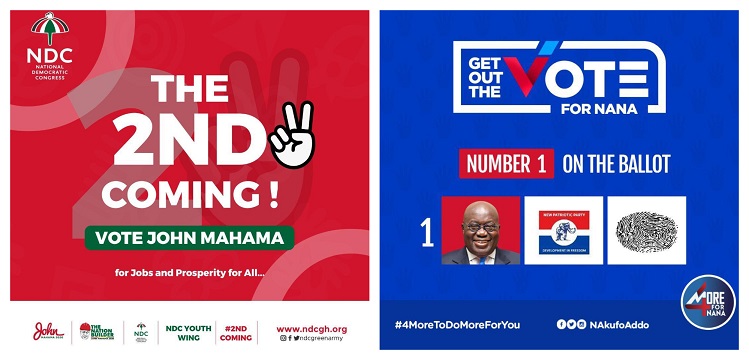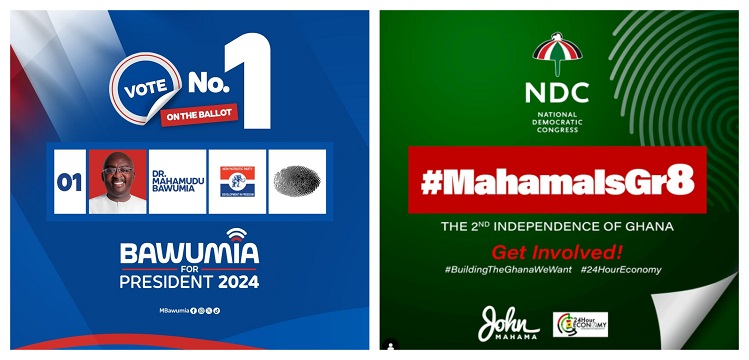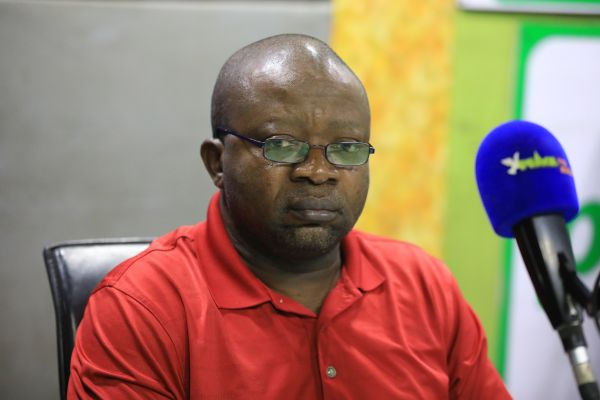GhanaWeb Feature
The positions candidates occupy on ballot papers have long been shrouded in mystique, shaping perceptions and influencing electoral outcomes. In Ghana’s political landscape, these positions are often imbued with symbolism, numerology, and strategic messaging, used to connect with voters in unique ways.
As the December 7, 2024, presidential elections approach, the question resurfaces: do ballot positions truly influence voter decisions, or are they merely artefacts of political folklore? This debate has gained traction after a contentious balloting exercise, marked by accusations of tampering.
Disagreements between political parties underscore the importance they and their supporters place on securing favourable ballot positions. Although some view the focus on ballot positions as superstition, others argue that in a country with high voter illiteracy, the physical placement of names on the ballot could impact voter choices. Some suggest that voters who struggle with literacy may gravitate toward certain positions, particularly if candidates have generated buzz around their spots.
Historical Context
The significance of ballot positions is not unique to Ghana. Globally, candidates believe certain ballot spots influence voter decisions. In Ghana, this belief has been a key element in electoral strategy since the 1992 elections, when political parties began emphasizing their ballot positions.
In 1992, Jerry John Rawlings occupied the fourth position, allowing the NDC to connect the number four to the Fourth Republic and the end of military rule. By 1996, Rawlings held the top spot, reinforcing his dominant political presence, as he defeated Kufuor. The 2000 election was a watershed moment, as Kufuor, despite being seventh on the ballot, won. His campaign slogan, "Aseε hɔ" (“The bottom”), captured the spirit of change, resonating with voters.
Subsequent elections continued to feature symbolic uses of ballot positions. In 2008, Akufo-Addo’s “Ɔyε number one” slogan emphasized leadership, while the NDC framed Mills’s third position as representative of a “trinity” symbolizing his third attempt at the presidency.
In 2016, Akufo-Addo, placed fifth, achieved a historic victory, with the NPP’s “High-Five” slogan capturing the popular will. By 2020, both parties utilized their ballot placements to bolster their campaigns, with Mahama’s "second coming" message aimed at reclaiming power.

Contemporary Analysis
The New Patriotic Party had barely secured the topmost position on the ballot paper for the 2024 elections when, in a flurry, they hitched that to a narrative of divine favour and electoral victory.
According to Dr. Mahamudu Bawumia, the NPP's presidential candidate, who reframed this placing as an action of God's approval, "We prayed unto the Lord, and we think God heard our prayer." This messaging aligns with the NPP’s broader campaign, presenting themselves as the leaders set to continue Ghana’s development trajectory.
Conversely, the opposition National Democratic Congress (NDC) seized upon its eighth position to reinforce its own symbolic message. The party argued that the number eight signified renewal and restoration, linking it to their campaign to "Break the 8"—a slogan they’ve used to promise an end to the NPP's eight-year rule.
NDC General Secretary, Fifi Fiavi Kwetey, declared during a press conference on September 20, 2024, "The eight is quite significant to tell the country that this is the moment to stop the decay after the eight years." The NDC has masterfully leveraged this narrative to frame itself as the force of change needed to reverse what they claim are years of corruption and economic mismanagement under the NPP.
The reaction of the public to such claims has been diverse. While party loyalists embrace the symbolic power of the numbers, many political commentators are skeptical, while a good number of the voters harbour a feeling that this constitutes a repetition of traditional rhetoric, which virtually always characterizes any election.
This skepticism has only been heightened by allegations of ballot tampering, which emerged shortly after the balloting process. Accusations that the materials used for the draw had been compromised further fueled tension between the parties and added a layer of distrust to what should have been a routine exercise.
Nonetheless, both parties continue to integrate their ballot positions into their campaign strategies. The NPP is leveraging the number one position to drive home the message of leadership and continuity, while the NDC is using the number eight to symbolize an unbreakable force poised to stop the NPP from extending their rule. This duality in messaging speaks to the deeply symbolic nature of the race, where every detail, even something as seemingly ordinary as a ballot position, becomes an opportunity to reinforce larger narratives.
Expert Opinions and Insights
While political parties often emphasize the symbolic value of ballot positions, experts argue that their true impact on voter behaviour depends on various contextual factors. According to Dr. Henry Boateng, branding and communication researcher and, consultant, the position of a candidate on the ballot paper is significant, but its influence varies based on the type of election, voter behaviour, and the visibility of the candidate's political party brand.
Research highlights the "ballot position effect," which suggests that candidates listed at the top of the ballot often enjoy greater visibility and recognition, much like how brands benefit from prime placement in marketing. "A candidate's name is a critical component of their party's brand identity," the lecturer explains in an interview with GhanaWeb.
"Cognitive biases, particularly the primacy effect, further shape decision-making. Candidates listed first often leave lasting impressions on voters, which is especially important for undecided voters who rely on mental shortcuts. In uncertain situations, these voters may choose the first name they encounter, reinforcing the impact of ballot position.”

Dr. Henry Boateng
However, the lecturer notes that this effect is weakened in high-profile elections—such as presidential or parliamentary contests—where voters tend to be better informed. "In these instances, the ‘ballot position effect’ diminishes, as informed voters are less influenced by the order in which candidates appear on the ballot."
Additionally, Dr. Henry Boateng points out that ballot positioning tends to impact candidates from minor parties more than those from well-established parties with strong brand visibility. Major party candidates, with their broader recognition, are less affected by the order in which their names appear. Thus, while ballot position matters, its effect depends on several factors, including voter awareness and the prominence of the candidates.
Building on this, Dr. Kobby Mensah, a political analyst, and lecturer, offers a broader electoral perspective, highlighting the dual importance of ballot position. According to the political marketing strategist, the impact of ballot positioning goes beyond symbolic interpretations, delving into both marketing strategies and the physical realities of voter behaviour.
“In electoral studies, there are two sides to the discussion,” Dr. Mensah explains. “First, it’s about how you market your ballot position so that the electorate can appreciate and effectively vote for you. You can liken that to any other positioning strategy in the market."
He draws parallels between political campaigns and product placement, noting that just as market leaders are often remembered due to their prominence, candidates at the top of the ballot enjoy a similar advantage. “The eye-level position is number one,” he adds, likening this to merchandising tactics where products at eye level are more likely to catch a customer’s attention.

Dr. Mensah also emphasizes how physical and psychological voter characteristics impact ballot positioning. For younger voters, who are often in a hurry and less politically engaged, the number one position is easy to find and stamp, whereas candidates in mid-table positions can be overlooked. For older voters, many of whom may face physical challenges, such as eyesight issues or arthritis, ballot positions lower on the list can make voting more difficult.
“Some of them have eyesight issues. Their eyes would dilate as they look deeper onto the ballot paper,” he says in an interview with GhanaWeb. “Some of them may have arthritis, their fingers are shaking, etcetera. So, when you're at the top, it's easy for them to stamp you out. When you're in the mid-table, they are likely to stamp two ballot positions.
“When you look at the empirical study on spoiled ballots, the majority of them happen in mid-table positions because the person is physically limited in guiding their thumb to stamp appropriately. So sometimes they might stamp two sites.”
This insight underscores the importance of both strategic ballot marketing and ballot design. Dr. Mensah highlights the need for sufficient white space between candidate positions to ensure voters can mark their choices clearly, minimizing spoiled ballots. Ultimately, he concludes, “the positioning on the ballot paper is very important... both for the narrative you create and the physical challenges voters may face.”

Dr. Kobby Mensah
While Dr. Kobby Mensah emphasizes the importance of this position on the ballot paper, a lecturer in Political Science at the University of Ghana, Dr. Kwame Asah-Asante, thinks differently. In the words of Dr. Asah-Asante, though the position of a candidate on the ballot paper may be noteworthy, these are not what have been considered determinants of electoral outcomes.
“People look out for the personalities involved,” Dr. Asah-Asante tells GhanaWeb. “In our part of the world, that position really doesn’t matter. Voters are looking for their candidate, whether they are number one, number eight, or last. They don’t vote because of the position on the ballot; they vote because of the candidate’s message, vision, and the impact they believe that candidate will have on their lives.”
According to Dr. Asah-Asante, while ballot position may serve in facilitating the communication process during the campaign by being able to dramatize slogans on the order of being on the ballot-the voters' decisions come from issues that involve more substance: economic concerns, infrastructure development, and anticorruption, which speak more to the population. He also underlines that the voters are considered rational actors who consider all the issues including the state of the economy, the unemployment rate, and all other issues in a region when casting their vote.
Dr. Asah-Asante, drawing examples from history, insisted that being on top of the ballot is no guarantee for electoral success. “We’ve seen candidates placed first lose, and those placed last, like President Kufuor in 2000, win,” he points out. For Dr. Asah-Asante, the real challenge for candidates is to offer a compelling message that addresses the electorate’s needs, rather than relying on where they appear on the ballot.
“The reason people fight for certain positions on the ballot is because it makes communication easier, but it ultimately depends on the message you attach to that position. That might give you a slight advantage. But the real question is: what is this candidate—whose face is on the ballot—going to do for me? What benefit will I gain?
“Voters are always rational and consider things like that. They don’t vote just for fun or simply because you're number one or two on the ballot. No, it’s more than that,” Dr. Asah-Asante argues.

Dr. Asah-Asante
Further Perspectives on Voter Behavior
A Senior Lecturer and Social Psychologist from the University of Ghana, who prefers to remain anonymous, offers another dimension to the discussion. In his interview with GhanaWeb, he emphasizes the diversity in voter behavior based on levels of enlightenment and meticulousness.
“For people who are very enlightened and meticulous, it doesn’t matter where their candidate is on the ballot. Even if their name is a thousandth on the list, they will find it,” he explains. “But for the sake of sensitization and educating the general public, especially those who are not as meticulous or well-informed, references like ‘it’s on top’ or ‘it’s at the bottom’ make it easier to guide their choice.”
He further draws attention to cultural influences that can impact voter perception. Using the Akan tradition as an example, he explains how certain numbers carry symbolic weight. “In Akan culture, the number five is seen as inappropriate, and people avoid giving gifts in fives. It’s similar to how the number 13 is seen as unlucky in Western cultures,” he points out, highlighting how superstitions and cultural myths may shape voter preferences.
The lecturer also stresses that voters today are more enlightened, thanks in part to the rise of media platforms. “People who haven’t been to school are now informed through radio and television,” he notes. "Political parties need to adapt from the strategies they used in the '90s because voters are much more discerning now."
For those deeply affiliated with political parties, however, rationality can be sidelined. “Some people are so obsessed with their party that they’ll vote for it no matter what,” he remarks. “Even if the party presented a non-human candidate, they would still vote. It shows the extent to which party loyalty overrides critical thinking.”
This reflection underscores the varying degrees of rationality among voters, with some being highly analytical while others are driven purely by party allegiance. In his view, the parties that fail to adapt to this evolving voter landscape risk becoming obsolete.
The Spiritual Perspective on Numbers and Elections
Beyond the social, cultural, and psychological factors said to influence voters' behavior, there's some spiritual dimension to these, they would say, that determines whom the people will vote for. Founder of Prophetic Hill Chapel, Prophet Nigel Gaisie explains what numbers mean, most especially within the context of elections.
According to Gaisie, numbers play a crucial role, as evidenced in both religious texts and numerology. He references when the Lord spoke to Moses, instructing him to group the people of God in specific numbers, signifying the importance of numerical order. “A number on a ballot box can tell whether God is with somebody or not,” he emphasizes, adding that numbers carry deeper meanings in both religious and symbolic contexts.
For instance, he notes that the number eight signifies a new order and restoration, a positive omen for those seeking to establish a fresh start. However, other numbers, such as 13 and 3, are viewed negatively in numerology.
“In numerology, 13 stands for confusion, and 3 is not a good number because it cannot be divided,” he explains. In contrast, the number 12 is seen as a symbol of leadership and strength.
Gaisie in an interview with GhanaWeb also touches on the political connotations of numbers, stating, “In political science, the number 1 signifies dictatorship and absoluteness, much like an emperor or ruler.” But he is quick to point out that winning an election involves much more than just securing a favourable number. “If you get number 1 and your performance does not support it, you will lose massively,” he warns, highlighting that a variety of factors—beyond just numbers—come together to determine electoral victory.

Prophet Nigel Gaisie
Conclusion:
Whether these positions will meaningfully impact undecided voters remains to be seen. In a race expected to be tightly contested, all parties are counting on every advantage they can muster, even one as intangible as ballot position symbolism. However, in the grand scheme, it may only serve to galvanize each party’s base, while the broader electorate focuses on policy, performance and other factors rather than symbolic gestures.
BB/SEA
Politics of Wednesday, 25 September 2024
Source: www.ghanaweb.com





![John Mahama, flagbearer of the NDC [L]; Dr Mahamudu Bawumia, flagbearer of the NPP [R] John Mahama, flagbearer of the NDC [L]; Dr Mahamudu Bawumia, flagbearer of the NPP [R]](https://cdn.ghanaweb.com/imagelib/pics/688/68848242.295.jpg)











